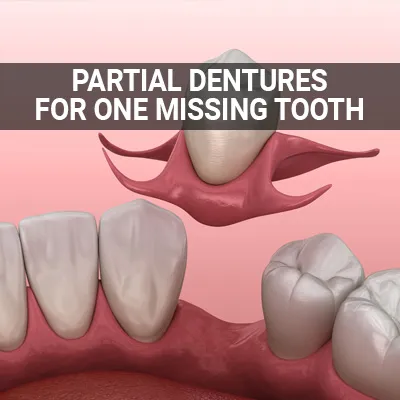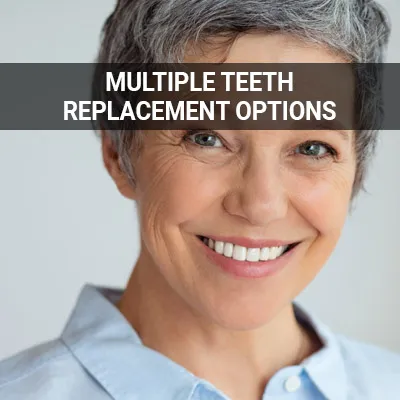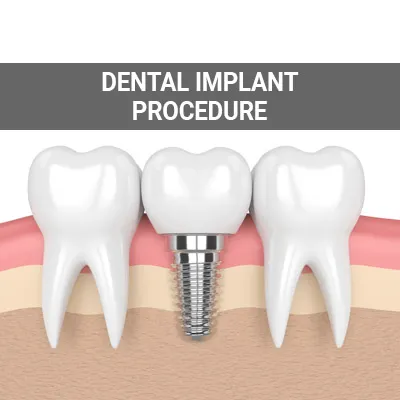Options for Replacing Missing Teeth Upland, CA
When you meet someone for the first time, one of the first things this person will notice is your smile. A full set of teeth will enhance your smile and appearance. Unfortunately, though teeth are strong and durable, they can be damaged and fall out due to injury or decay. Replacing missing teeth can restore your smile and allow you to eat and speak normally again.
Options for missing teeth are available at Upland Dental Group And Implant Center in Upland and the surrounding area. You should speak to our team about which options make the most sense for your budget and needs. We can provide you with a solution that you can feel good about. Call us today at (909) 660-6080 and schedule an appointment.
Available treatments
The good news for patients who are missing teeth is that there are effective options to correct these issues. An evaluation will factor in a person's medical history, the severity of oral health conditions, and how many teeth are missing to decide on the preferred treatment option. Options our team might recommend include:
- Dentures: These can be full or partial. Dentures are removable and made to look like natural teeth.
- Implants: This process takes longer than other options, but implants are more durable. Implants work well for patients who are missing multiple teeth.
- Bridges: As an article on WebMD explains, this treatment fixes artificial teeth to crowns over natural teeth. Bridges can stop surrounding teeth from shifting.
All treatment options have benefits and challenges. Therefore, it is essential for both the patient and the dentist to openly discuss what is available. Then decide on the right fit.
“An evaluation will factor in a person’s medical history, the severity of oral health conditions, and how many teeth are missing to decide on the preferred treatment option.”
Durability Comparison of Tooth Replacement Options
Durability is a critical factor when choosing a long-term treatment option. How long something will last impacts the time it takes out of your life and how much it will cost. The last thing a patient wants is to return to the office every couple of years for more dental work treating the same issues.
Implants are the most durable option. According to an article in Healthline, this is the main advantage of dental implants. These titanium false teeth can last up to 20 years with proper care and maintenance. Implants also replace a tooth's roots and can make this system as stable as natural roots.
Bridges will not last as long as implants, but this combination of artificial teeth, crowns, and natural teeth can serve a patient well for a decade or longer. It is not removable, but routine visits with your doctor will help monitor the bridge for wear.
Dentures are a moderately durable option and typically require replacement more often than implants and bridges. Patients will need to replace them every seven to eight years. However, the patient should be able to eat most foods with dentures.
“The last thing a patient wants is to return to the office every couple of years for more dental work treating the same issues.”
The Role of Age on Replacing Missing Teeth
Regardless of a person's age, it is vital to have functioning teeth. Missing teeth makes chewing more difficult, can weaken oral health, and can affect appearance. Our staff will consider a person's age when deciding what option for replacing missing teeth is right. For example, older patients may not be concerned about a solution that will last for 20 years and beyond. Older adults may prefer dentures for this reason and because it takes less work to clean.
Conversely, young patients are more active and may find themselves in more social situations. For this reason, they may prefer to choose implants. Also, younger patients are more likely to be in good overall health. Overall oral and physical health is an important criteria for being a good candidate for dental implants.
“Regardless of a person’s age, it is vital to have functioning teeth.”
Check out what others are saying about our dental services on Yelp: Options for Replacing Missing Teeth in Upland, CA
Choosing the Right Options for Replacing Missing Teeth
It is beneficial to understand the different treatment options. Patients should consider the extent of their issues. For only a couple of missing teeth, a bridge or implants may make the most sense. For several missing teeth, partial dentures are a good option. Getting full dentures is a common solution to replace all missing teeth.
Patients need to budget wisely too. Implants may be the most long-lasting treatment, but it can be the most expensive as well. People who have less to spend should consider dentures or dental bridges instead. People should look at their lifestyle and determine which replacement option fits their needs and preferences.
“People should look at their lifestyle and determine which replacement option fits their needs and preferences.”
Questions Answered on This Page
Q. How can a dentist replace missing teeth?
Q. What is the most durable option for replacing missing teeth?
Q. How does age affect your options when it comes to replacing missing teeth?
Q. What should you consider when deciding on a tooth replacement option?
People Also Ask
Q. Who is a good candidate for dental implants?
Q. What happens during the dental implant procedure?
Q. What are the benefits of dental implants?
Q. How can I prepare for my first implant procedure?
Frequently Asked Questions
Q. Who is a good candidate for implants?
A. One of the nice things about dental implants is that this option can work well no matter how many missing teeth a person has. It is also a good choice for patients who do not want to worry about another replacement treatment for the next 20 to 25 years.
Q. Are these options for replacing missing teeth painful?
A. Many people have anxiety about dental visits. However, getting a bridge, dentures, or implants does not involve much, if any, pain. Our dentist will give patients a local anesthetic to numb the area. Patients may feel a little soreness for a couple of days and can manage any discomfort with over-the-counter pain medication.
Q. Will insurance cover the replacement treatments?
A. Patients should check with their insurance provider before visiting our office. Some plans may cover part of the procedure, though others will consider the treatments cosmetic. If you are considering financing options, you may also speak with our staff.
Q. Are replacements essential?
A. In some cases, our dentist may be able to salvage severely decayed teeth. However, if a tooth has been completely knocked out, a replacement option may be necessary.
Q. What happens if dentures break?
A. If a patient discovers a crack or a break in the dentures, it is essential to call the dentist immediately. There are home repair kits available, but it is always more effective to contact the dentist. Our office has the right equipment and tools to help repair the apparatus properly.
Q. What can people who wear dentures eat?
A. Patients should start by eating soft foods until they are used to the dentures. From there, the wearers can gradually move onto harder foods. Our dentist can give you advice on which foods might give you trouble.
Dental Implant Terminology
It Is Time to Start Feeling Confident About Your Appearance
You may be amazed by what a big difference a new smile makes. Our staff is eager to help restore your mouth and looks. Call us today at 909-660-6080 so you can replace your missing teeth. You can feel more at ease about eating, speaking, and meeting new people in Upland.
Helpful Related Links
- American Dental Association (ADA). Glossary of Dental Clinical Terms. 2024
- American Academy of Cosmetic Dentistry (AACD). Home Page. 2024
- WebMD. WebMD’s Oral Care Guide. 2024
About our business and website security
- Upland Dental Group And Implant Center was established in 2016.
- We accept the following payment methods: American Express, Cash, Check, Discover, MasterCard, and Visa
- We serve patients from the following counties: Los Angeles County, San Bernardino County and Riverside County
- We serve patients from the following cities: Upland, La Verne, San Dimas, Rialto, Pomona, Claremont, Montclair, Fontana, San Bernardino, Rancho Cucamonga, Ontario, Hesperia and Apple Valley
- Norton Safe Web. View Details
- Trend Micro Site Safety Center. View Details
Back to top of Options for Replacing Missing Teeth













